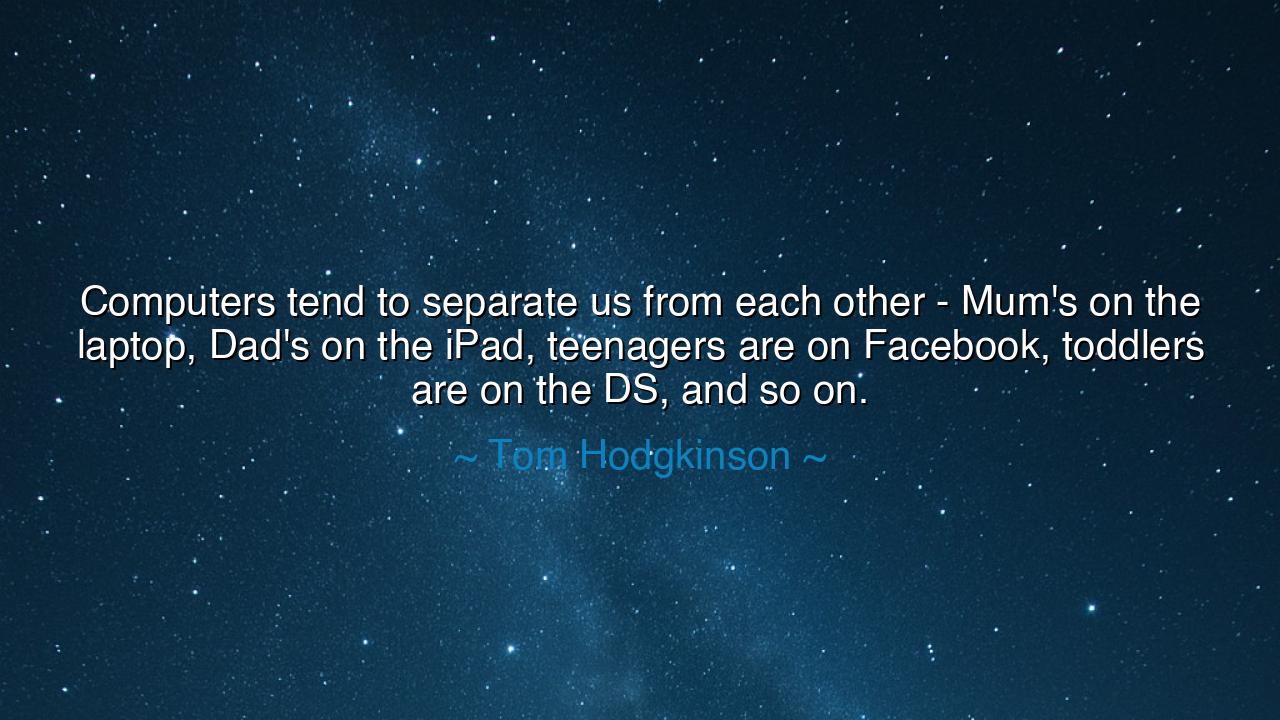
Computers tend to separate us from each other - Mum's on the
Computers tend to separate us from each other - Mum's on the laptop, Dad's on the iPad, teenagers are on Facebook, toddlers are on the DS, and so on.






In the quiet hum of the modern world, where technology reigns supreme, we must pause and ask ourselves: What price do we pay for progress? The great thinker Tom Hodgkinson once observed, “Computers tend to separate us from each other - Mum’s on the laptop, Dad’s on the iPad, teenagers are on Facebook, toddlers are on the DS, and so on.” These words, though simple, carry with them the weight of a truth that has echoed through the corridors of time: technology, for all its promise of connection, has often distanced us from the very thing we hold most dear—each other. In the pursuit of convenience and speed, we may have lost the depth and richness of human connection.
In the ancient world, the community was the heartbeat of civilization. Whether in the agora of ancient Athens, where men gathered to discuss philosophy and politics, or in the village where families worked together to harvest crops and celebrate life, the essence of human existence was rooted in shared experiences. The elders spoke, the children played, and each person contributed to the collective well-being. The concept of family and tribe was inseparable from the physical presence of one another. The bond between parent and child, neighbor and friend, was forged in conversation, work, and shared joy. And yet, in our modern world, the tools that were meant to bring us closer have instead created walls between us.
Hodgkinson’s words capture the modern paradox: that we are more connected than ever before, but at the cost of disconnection. As he paints the picture of a family divided by devices—Mum on her laptop, Dad on his iPad, teenagers lost in the digital world of Facebook, and toddlers absorbed in their DS—we see not the unity of a family, but the fragmentation of human connection. The tools that once held the promise of bringing people together have, in many ways, pushed us into isolated worlds, each staring into our screens, only to realize that we have lost the warmth of each other’s presence.
In the stories of ancient civilizations, we find that communication and shared work were the bedrock of thriving communities. The Romans, for example, built their empire not just on the strength of their armies but on the unity and efficiency of their society. Roman families worked together in the fields, at the hearth, and in the home. Even in the grand forums, the exchange of ideas was done face to face, and the bonds between citizens were cemented in shared experiences. Technology, at the time, was rudimentary, but the human connection was rich and vital. Today, we have tools that promise to enhance our lives, but instead, they often leave us adrift in a sea of superficial interactions and disconnected lives.
The lesson embedded in Hodgkinson’s words is a call to balance. We must recognize that technology itself is not inherently harmful—it is how we choose to wield it that defines its place in our lives. Just as the ancients understood the importance of community and face-to-face communication, we too must find ways to integrate the gifts of modern technology without losing the core of what makes us human: our relationships. The value of a conversation around the dinner table cannot be replaced by an email or a text message, just as the warmth of a hug cannot be replicated through a screen.
Let us then take this wisdom into our own lives. While we may embrace the convenience of modern tools—whether it be the computer, the tablet, or the phone—we must also carve out spaces for true human connection. Make time for the shared moments, the unplugged conversations, the physical presence that nourishes the spirit. When we sit with our loved ones, let us put down our devices, look into their eyes, and reconnect with the essence of what it means to be together. Let us remember that the bonds we form in this life are not built on pixels and screens, but on touch, voice, and the genuine exchange of ideas and love.
In the end, the true treasure of life lies not in the gadgets we possess or the information we can access, but in the connections we forge with those who walk beside us. Let the lesson of Hodgkinson remind us that technology, for all its wonders, should never replace the sacredness of shared human experience. Let us be mindful of the time we spend alone with our devices and instead choose to spend our days in the company of those we love, nourishing the bonds that will truly sustain us in the long run.






AAdministratorAdministrator
Welcome, honored guests. Please leave a comment, we will respond soon